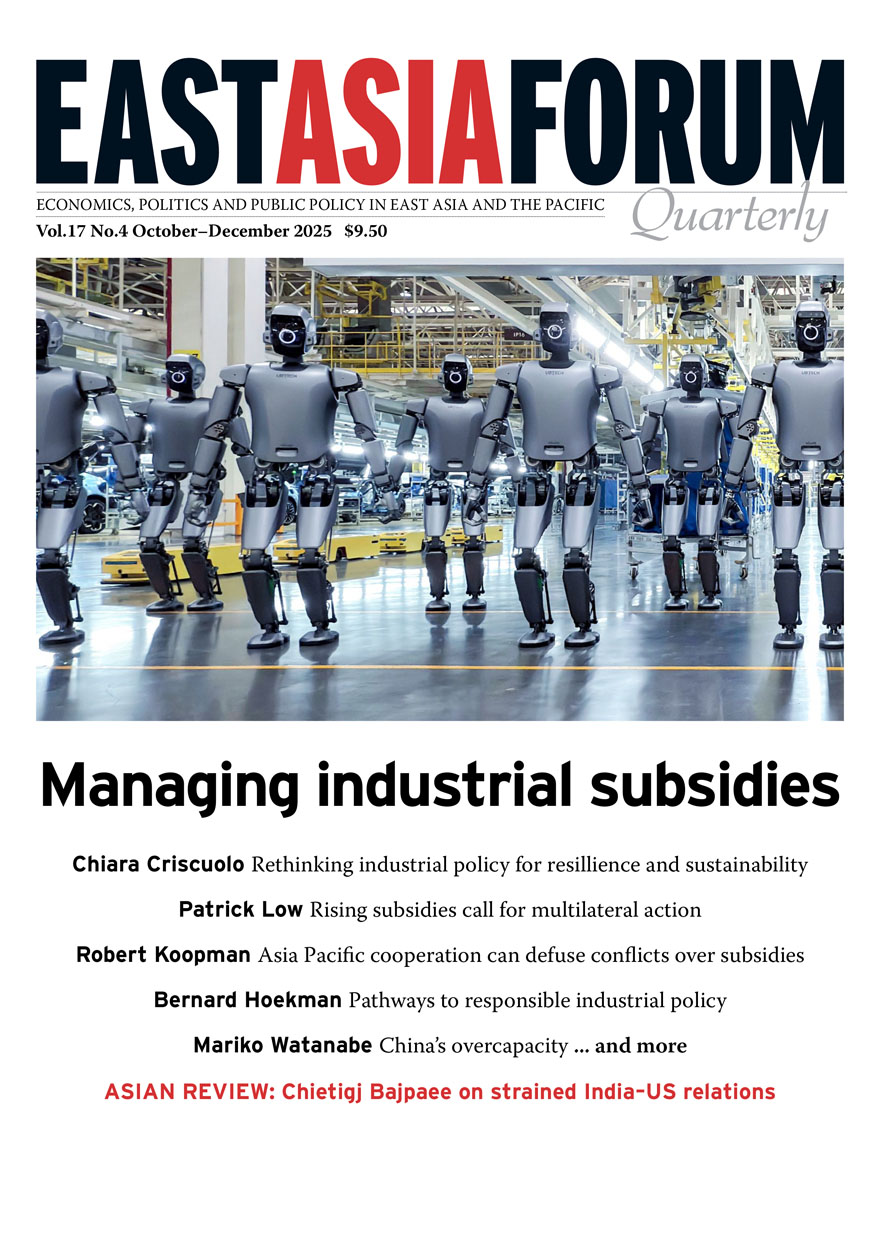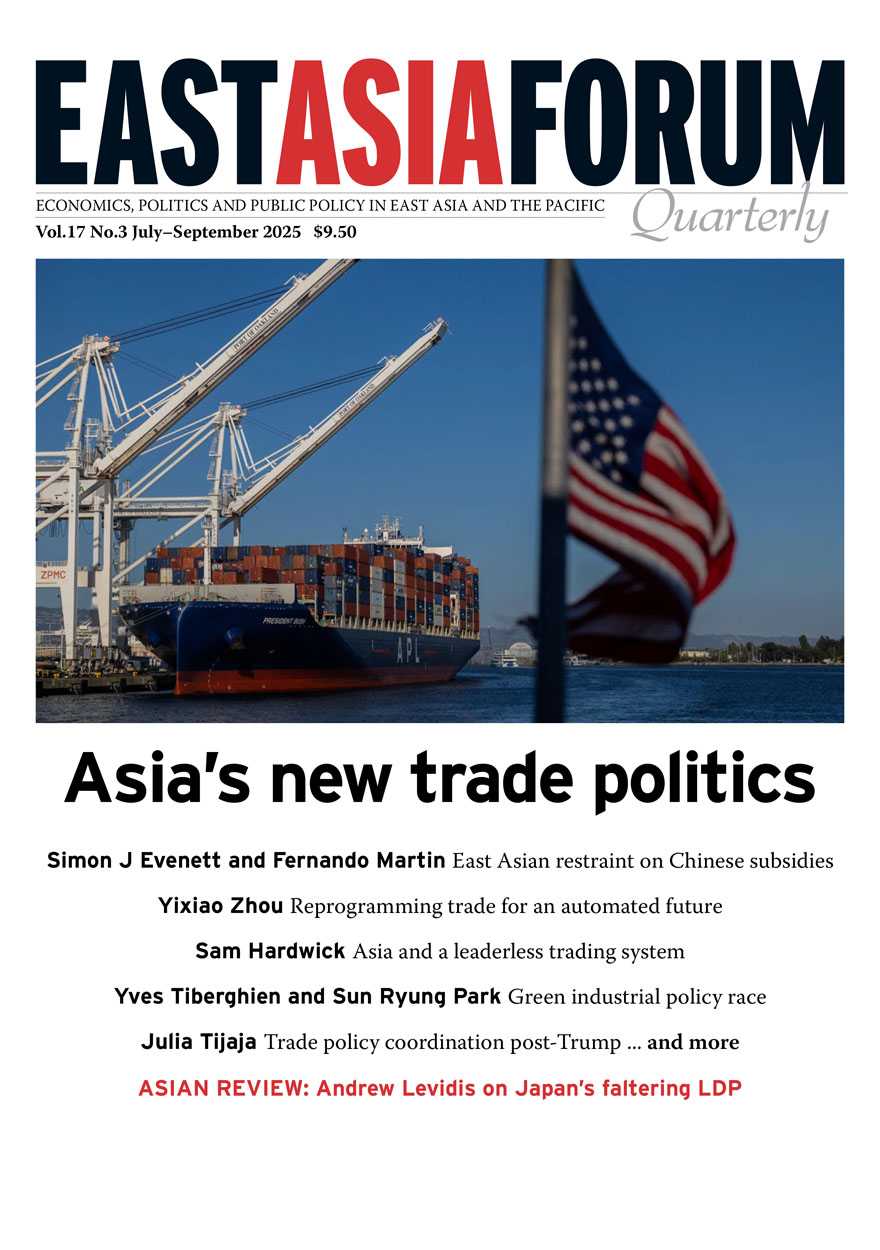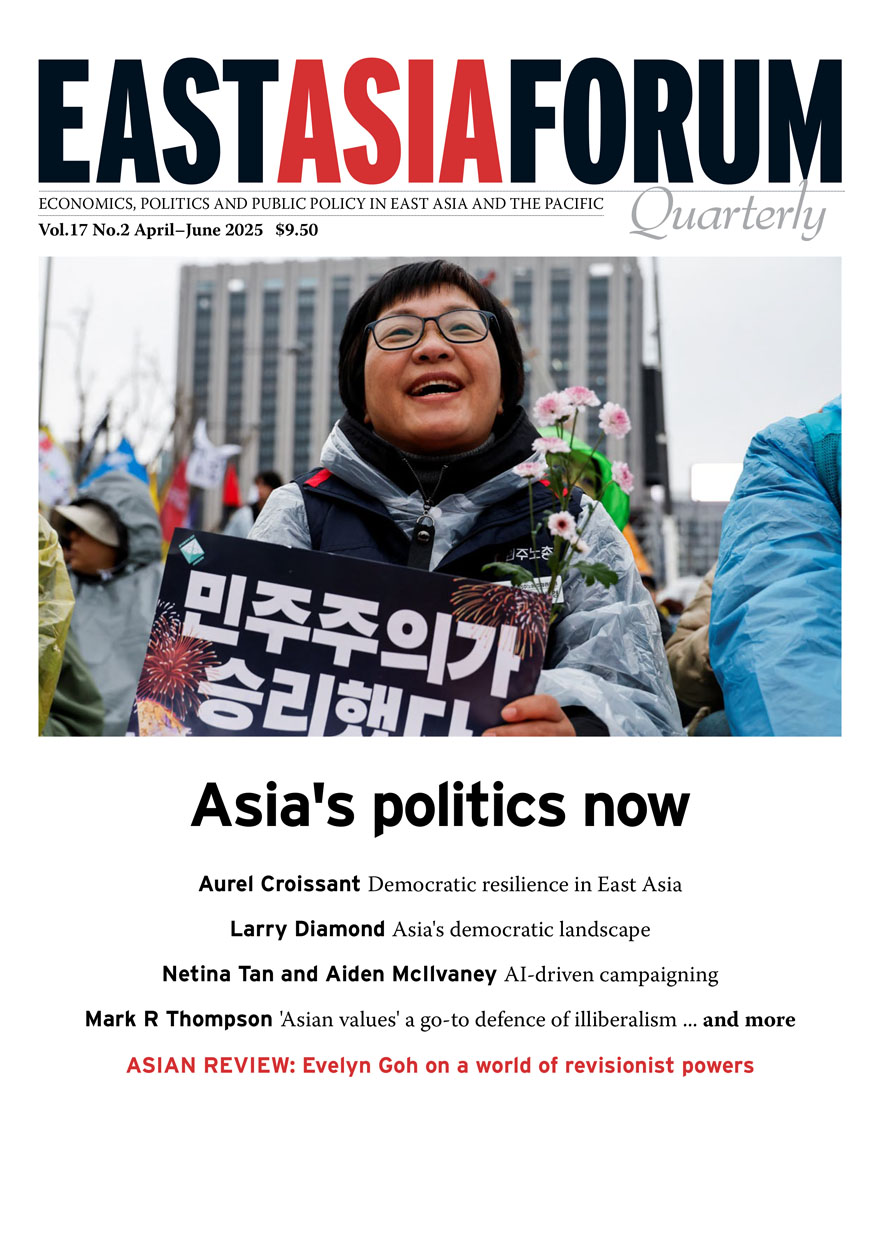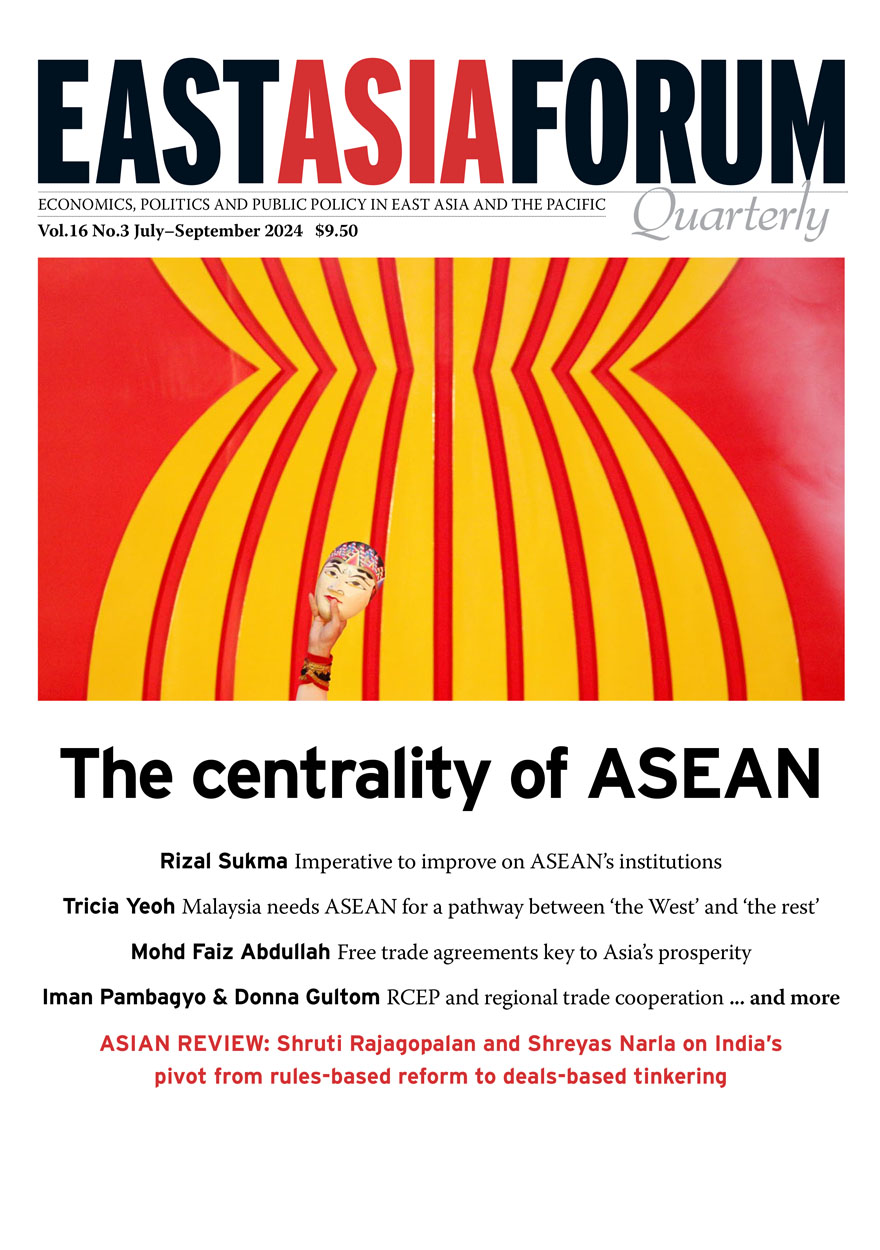Search titles
Displaying results 1 to 10 of 133.

East Asia Forum Quarterly: Volume 17, Number 4, 2025 »
Publication date: December 2025
Industrial policy has returned to the mainstream, with subsidies as an increasingly popular policy instrument of choice. While East Asia is deeply invested in the open global trade regime, multilateral rules are outdated, weakly enforced and ill-equipped to manage the widening gap among countries with unequal fiscal capacity. This issue of the East Asia Forum Quarterly examines the rationale, forms and effects of industrial policy resurgence, identifying both its risks and the conditions for its success. It argues that regional coordination of industrial policy would require greater transparency and peer review, using existing frameworks as well as new plurilateral agreements for that purpose. The region has the platforms and leverage to lead collective efforts to manage industrial policies without undermining the rules-based multilateral order, but whether it can will depend on mobilising the political will.
Download for free
Not available for purchase

East Asia Forum Quarterly: Volume 17, Number 3, 2025 »
Publication date: August 2025
US protectionism is reshaping Asia’s trade politics. Rising tariffs and unpredictability from Washington are chilling investment, disrupting supply chains and driving governments towards transactional deals that corrode longstanding multilateral rules. This edition of East Asia Forum Quarterly maps the terrain on which Asia must choose between short-term accommodation and long-term growth and resilience. In an increasingly fragmented world, Asia’s best defence is to strengthen institutions to safeguard integration and hunker down behind the multilateral system—while preparing to take a leading role in rebuilding it.
Download for free
Not available for purchase

East Asia Forum Quarterly: Volume 17, Number 2, 2025 »
Publication date: May 2025
Asia is home to some of the world’s most diverse political systems—from liberal democracies to authoritarian regimes and hybrid states. As global democracy faces renewed pressure, this edition of East Asia Forum Quarterly explores how political systems across Asia are evolving amid rising autocratisation. It examines why economic development alone cannot explain democratic outcomes in the region and how authoritarian success stories are reshaping debates about governance. With ideological contestation intensifying, Asia is not just adapting to global political trends—it is helping to define them.
Download for free
Not available for purchase

East Asia Forum Quarterly: Volume 17, Number 1, 2025 »
Publication date: March 2025
The global landscape has shifted dramatically since Donald Trump’s return to the presidency in January 2025. His decision to exit the Paris Agreement and impose heavy tariffs has escalated uncertainty surrounding both climate action and the global economic order. This edition of East Asia Forum Quarterly explores how ASEAN and its regional partners can step in to safeguard multilateral trade and climate cooperation, advocating for green trade policies and sustainable investment. The region has the potential to reshape the global response to climate change and maintain economic stability through strategic collaboration.
Download for free
Not available for purchase

East Asia Forum Quarterly: Volume 16, Number 4, 2024 »
Publication date: December 2024
The global economy’s trajectory toward instability has been evident since Trump 1.0. A second Trump presidency will likely amplify protectionism, strategic competition and global disorder. This edition of East Asia Forum Quarterly examines how Asia can respond, emphasising the region’s role in defending multilateralism, addressing climate change and ensuring global stability.
Download for free
Not available for purchase

East Asia Forum Quarterly: Volume 16, Number 3, 2024 »
Publication date: September 2024
ASEAN's rise as the cornerstone of regional diplomacy and security in the 1990s may have seemed improbable, but it was crucial. Today, a shifting regional geopolitical landscape challenges ASEAN’s relevance. Great power competition and waning global political commitment to multilateral arrangements threaten its role as East Asia’s 'steering committee'. This edition of East Asia Forum Quarterly explores how ASEAN can maintain its centrality, calling for proactive leadership and stronger regional cooperation.
Download for free
Not available for purchase

East Asia Forum Quarterly: Volume 16, Number 2, 2024 »
Publication date: June 2024
Key in globalisation, supply chains connect producers to consumers across nations and specialisations. Recently, geopolitics, the COVID-19 pandemic and European conflicts have reshaped these networks. Supply chains are increasingly influenced by statecraft and protectionism, moving away from multilateral cooperation. This issue of East Asia Forum Quarterly explores the rapid transformation of supply chains, the paradox of digital innovation in trade and the consequences of economic isolationism.
Download for free
Not available for purchase

East Asia Forum Quarterly: Volume 15, Number 4, 2023 »
Publication date: November 2023
It’s back: the past decade has seen a remarkable resurgence of industrial policy in the developed world. Geopolitical fragmentation and resultant suspicions of international trade, the politically induced adoption of second-best industrial policies to address carbon emissions, and the use of manufacturing incentives sparked by fears of deindustrialisation and widening inequality risk tit-for-tat protectionism and further splintering of the global economy. This issue of East Asia Forum Quarterly examines what the new enthusiasm for industrial policy activism means for the global system and Asian economies: exploring its effects on the ability of emerging Asian economies’ to break into manufacturing in global value chains; investigating how measures aimed at encouraging domestic processing of raw materials affect the stability of policy environments and green industrialisation; detailing and comparing the experiences of major regional economies with policy developments in semiconductor and electric vehicle manufacturing and renewable energy; and appraising industrial policy’s effects on smaller economies and the rules-based trading system from a global perspective.
Download for free
Not available for purchase

East Asia Forum Quarterly: Volume 15, Number 3, 2023 »
Publication date: September 2023
As ASEAN and Japan celebrate the 50th anniversary of their official relationship, the challenge to redefine the goals and purpose of this relationship is now pressing. Great power rivalry, regional power relativities, and sweeping political and economic disruption have injected new dynamics and exposed serious vulnerabilities. With ASEAN member states and Japan each facing their own domestic challenges, the opportunity presents itself for a more 'equal' partnership that is able to 'co-create' a regional economy and society, from paternalistic origins. This issue of East Asia Forum Quarterly addresses these challenges for the ASEAN–Japan relationship and offers ideas, vision and initiatives that might guide its future: exploring the policy options for a relationship challenged by regional economic fragmentation; detailing the lessons available for policymakers beginning to act on sustainability and digital and green transformation; and examining the opportunities taken and thus far unrealised for the fashioning of new soft diplomacy and investment in intra-ASEAN infrastructure.
Download for free
Not available for purchase

East Asia Forum Quarterly: Volume 15, Number 2, 2023 »
Publication date: June 2023
Global trade stands at a crucial crossroads. The multilateral trading system that underpinned globalisation for three-quarters of a century is being pulled apart by big power politics and the way forward is fogged in mistrust. Global growth is projected to decline this year and remain anaemic. Inflation, the rising rivalry between the world’s two largest economies, and Russia’s invasion of Ukraine weigh heavily on the global outlook. The European war underscores how quickly the trading ties between nations might be undone and weaponised. This issue of East Asia Forum Quarterly examines the impact of trade sanctions as they rip into the trading system well beyond the battlefield. It interrogates how far sanctions have succeeded in hobbling Russia’s war machine and questions their deterrent value outside of conflict or their universal application, explores how supply chains have reshuffled around the reach of regulators, and asks how nations are probing opportunities created by the conflict.
Download for free
Not available for purchase



